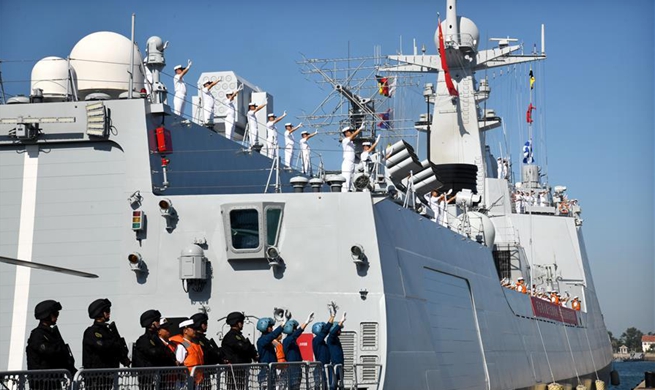LONDON, Aug. 30 (Xinhua) -- A paddle steamer which sank on its maiden voyage to work as a gun runner for the Confederates in the American Civil War on Friday was granted protection in Britain as an official shipwreck.
The wreck of the Lelia lies in Liverpool Bay and is one of the most historically-significant wrecks in England, according to the Department for Digital, Culture, Media and Sport (DCMS).
The technically advanced, purpose-built blockade runner was secretly ordered on behalf of the Confederate Government and was built in a Liverpool shipyard late in the American Civil War of 1861-1865.
Leaving Liverpool for Bermuda on its maiden voyage on Jan. 14 1865, the steamer foundered in Liverpool Bay in stormy weather with the loss of 47 lives.
On the advice of Historic England, DCMS has officially recognised the Lelia in a schedule of historic shipwrecks. and has been added to the National Heritage List for England.
The wreck was identified when a bell marked "Lelia 1864" was discovered by a local diver. In 2017, Historic England commissioned an assessment of the Lelia as part of a project to carry out a national overview of vessels with early iron and composite hulls.
Heritage Minister Rebecca Pow said: "Protecting sites like the wreck of the Lelia helps us to preserve an important story about Britain's role in the American Civil War. Although the conflict happened over a hundred years ago, it is right that we ensure the protection of this site so we can learn more about one of the most significant shipwrecks off the coast of North West England."
Duncan Wilson, CEO of Historic England said: "The Lelia is one of a small group of British ships involved in British complicity in running guns and munitions to the Confederates. Though the UK remained officially neutral throughout the American Civil War, the Lelia comprises evidence of the British financing of blockade runners that sent munitions and luxuries to Confederate ports in return for cotton and tobacco. As such it is very significant as historical evidence."
A spokesperson for Historic England said: "At the beginning of the American Civil War, the Confederacy lacked the manufacturing capacity to compete with the more industrialised northern Union so it relied on importing war supplies, including guns and ammunition, to sustain its war effort.
"The Confederates also acquired fast steamships, which were mainly paddle steamers from British and other shipbuilders. They were intended to breach the naval blockade of the main Confederate ports imposed by the Union in 1861 in an attempt to strangle the southern war effort. They hoped a combination of speed and stealth would help them to break the blockade, enabling them to carry cotton and tobacco out to Europe and war supplies back in."













